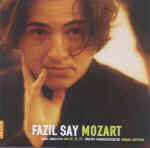The proficiency and high polish characterizing these Mozart concerto performances creates a chilly, uninviting aura. Part of the problem stems from sonics whose reverberant ambience downplays the amazing timbral diversity of Mozart’s orchestrations. Though discipline and control govern the lyrical, sustained string writing in the slow movements, Howard Griffiths elicits little expressive variety and singing impulse compared to the gorgeously sung-out results that other conductors obtain. For example, Vladimir Spivakov’s slower tempo for K. 414’s central movement sounds faster by virtue of his clearer projection of the bass lines and operatic inflections of phrase. Similarly, the bubbling woodwind repartée in the finales of K. 467 and K. 488 lacks the sparkle and conversational impulse you hear in recordings as different as Schiff/Vegh (Decca) and Bilson/Gardiner (DG), although K. 488’s first movement is better in this regard.
Soloist Fazil Say’s contributions also leave mixed impressions. He churns out loud, machine-like, uniform phrases in K. 414’s finale that contrast to the teen-aged Evgeny Kissin’s more characterful, varied articulation under Spivakov. Alternatively, Say underprojects his slow-movement entrances, hoping to grab attention down the road, so to speak, with a sudden dynamic tweak. In K. 467’s central “Elvira Madigan” movement, for example, Say takes Mozart’s rubato definition to heart (playing the right hand freely against the left hand’s steady pulse), but he often miscalculates the dosages (although his outer movement cadenzas bristle with invention). As the tiny, twitchy accelerandos and preciously clipped detaché articulation in K. 488’s slow movement bear out, Say lacks the simplicity and expressive economy that yield deeper and far more satisfying results via Curzon/Szell (Decca) and Moravec/Vlach (Suprahon). Needless to say, Say and Griffiths face formidable catalog competition.
































